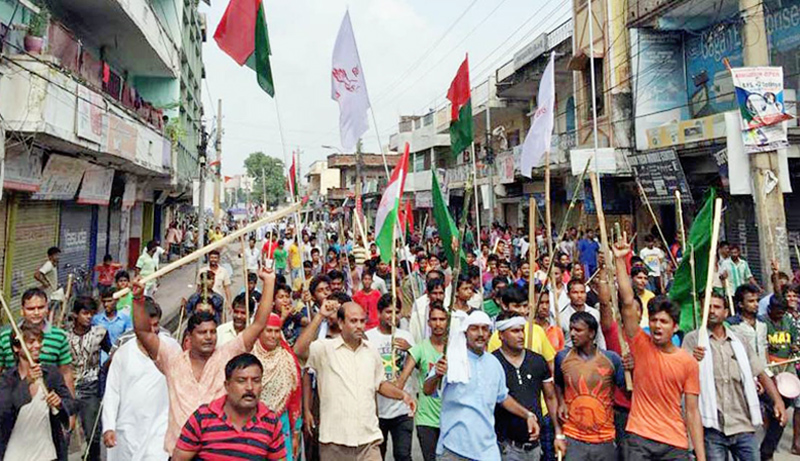Madhesis’ concerns remain unaddressed
Madhes continues to occupy an important place in national politics. Tarai Congress led by Bedanand Jha had championed the cause of federalism and the recognition of Hindi as lingua franca after the end of Rana regime. The major issues that Madhesis raised immediately after the end of Rana regime 64 years ago remain unresolved today.
There is a lack of confidence between Madhesi people and the Nepali state. Madhesis want to be equal citizens of this country but the major political parties view their demands as communal and even against the national interests.
Rulers have since long adopted a policy of exclusion vis-a-vis Madhesis. Madhesis are targeted by security agencies for raising their voice. Madhesis’ concerns require multi-pronged strategies on the part of the government.
Behaviour neutrality in executive, judiciary and legislature, even journalism, is necessary to address the concerns of the marginalised communities, including Madhesis.
There are problems in Madhes but the irony is that Madhesi leaders play with the sentiments of Madhes. They speak different languages to suit the interests of the audiences. In fact, Madhesi leaders use one kind of language when they are in opposition and they use different language when they are in power or in government positions. Madhesi leaders give fiery speeches when they address crowds on the road.
The leaders of national parties must rise above their own ethnic identity to genuinely integrate all the marginalised communities of the country. Behaviour neutrality requires that all sections genuinely support the causes of the marginalised. This means that Pahadi leaders should not feel that because they are from the hill areas, they should always support the cause of the hills and a Madhesi leader should also not think that as s/he belongs to the plains s/he should always speak for the Tarai people. All sections of the society should be ready to support the genuine issues and then only our society will be integrated in national mainstream.
Behaviour neutrality will support the cause of cohesion in the country. If stakeholders do not want to understand the causes of frustration, ignorance, discrimination and rebelliousness of Madhesis and if they do not show flexibility to accommodate their genuine concerns in the new constitution, the next threat the country would face would be from the separatist elements.
Madhesis want to be equal citizens and they want their language and culture to be protected. Mainstream political parties should understand this very well.
Ignoring the issues of equality and equal justice, the major agendas of Madhes Movement, will not serve the interests of the country.
Those who want to see the country emerge as a country of all regions and communities integrated in a real sense and those who want to see the country charting out the path of prosperity should join hands with the forces that are fighting against discrimination.
If state organs do not reflect Nepal’s diversity, state officials’ behaviour towards those communities whose representation in the state organs is very low, could lead the marginalised to view the state officials of the dominant communities as communal. When the identity of certain communities is not respected, people use different methods to find solution to their problems.
Examples around the world show that whenever people felt that their identity and honour were not respected and they were not being treated equally, they fought a fierce battle to protect their identity and social system.
Government of Nepal has to implement immediately the agreements signed with Madhesi forces. The agreements that are central to the Madhesi empowerment are : four-point agreement signed in 1999, three-point agreement in 1999, 22-point agreement inked in 2008 and eight-point agreement signed in 2008 with the Madhesi forces. State should not give an impression to the Madhesis, Tharus, Janajatis and other marginalised people that it is okay for the government or the state not to implement the past agreements.
When one government signs an agreement and another government refuses to accept that agreement, then conflict is bound to occur.
Government policies and programmes are discriminatory against Madhesis and marginalised communities but the irony is that most of the media outlets, rights activists and bureaucracy justify the discrimination that alienated Madhesis.
The country must make genuine efforts to bring Madhesi people into the mainstream and that will happen when they are integrated into state organs and their language and culture are recognised.
National parties give catchy slogans in Madhes to attract Madhesi voters but the reality is that their representatives’ voices are not heard within the Madhesi parties. The problem with the Madhesi parties is that they solicit votes in Madhes in the name of Madhesi cause, but the irony is that when they come to Kathmandu, they use people’s vote only for avail power and prestige.
Madhesi forces need to replace the discredited forces and those who trade Madhesi cause with power and money. Opportunism among the Madhesi forces remains a major hurdle why Madhesi parties are weak despite overwhelming support of the Madhesi people for their cause.
As the constitutional issues hot up in the country, Madhesis are angry with the three major parties. They sometimes use violence to express their anger as was seen during protests recently. On the other hand, the three major parties and the government seem to have adopted a strategy to suppress Madhesis’ movement for rights. Kathmandu should understand that Madhesis are fighting their battle for rights and would not rest without securing their rights, their battle may take some time. Longer, they fight for their rights, more the country will suffer. Magnanimity and flexibility can alone solve the Madhes problems. I hope the major stakeholders will realise the gravity of the problem and try to address the concerns of the Madhesi and Tharu communities in the new constitution.
(Writer has done PhD in Madhes movement and evolution of Madhesism)




